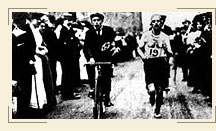|
 Did
you know?
Did
you know?
- On
7 July 1908, during the Olympic Games, died Dimitrios Vikelas,
who had been the first president of the IOC. 
- One of the spectators who hastened to help Dorando Pietri,
so that he could finish in the marathon, was Arthur Conan
Doyle, the creator of "Sherlock Holmes". Doyle helped the
Italian at one of the four times he fell only a few metres
before the finish line. In this way he had contributed to
the disqualification of Pietri, as had done the judges of
the event.
- During the Games the weather was constantly rainy, even
during the summer months. Therefore, it was raining even on
30 June, at the opening ceremony of the Games. Notwithstanding,
25,000 spectators approximately were present at the stadium
that was specially fitted out for the fourth Olympic Games.
- The Russian shooters were not able to participate in the
event because they arrived with quite a delay at the Games.
That had happened because they did not take into consideration
the calendrical difference of the twelve days between Russia,
where the Gregorian calendar was used, and Britain, which
had adopted the Julian calendar.
- Archers Willy and Lottie Dod became the first brother and
sister medallists.
- It was the first time that the marathon athletes covered
the distance of 42km and 195m. The 195m were added due to
chance reasons. More specifically, that was the exact distance
between Windsor Castle, where started the marathon, and the
royal box in the stadium, where the finish would take place.
This distance became official from 1924 onwards.
- There were very few individual entries in those Games, since
it was the first time that most entries were made at national
level. In addition, a maximum of entries was set for each
event, since no delegation could apply for more than 12 athletes,
a number that reduced considerably in the following organizations.
- Figure skating made its first appearance in the Olympic
Games of 1908. The winner was Nikolai Panin, the first Russian
Olympic winner. Russia won two more medals, silver, in those
Games. In the following organization, the 1912 Stockholm Games,
Russia won two silvers and two bronzes. Therefore, the gold
medal of Panin was the only one for the country until 1952,
when the Soviet Union gave an end to the policy of abstention
from the Olympic Games and participated in the Melbourne Games.
|